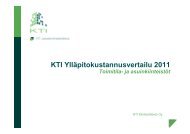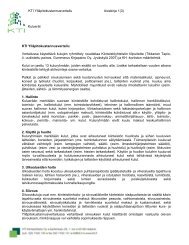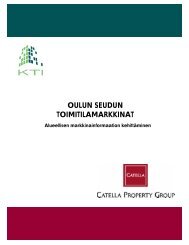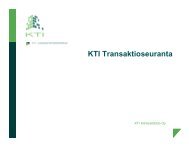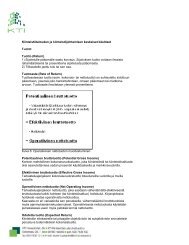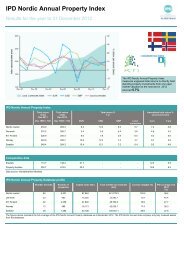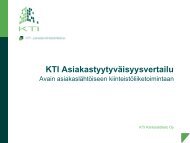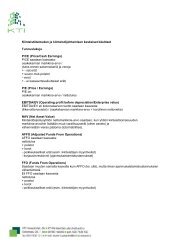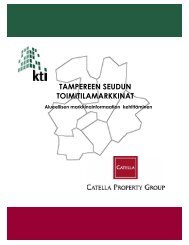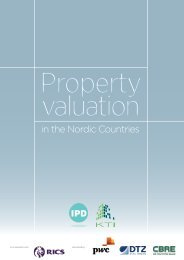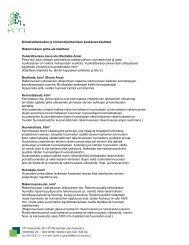The Finnish Property Market 2012 - KTI
The Finnish Property Market 2012 - KTI
The Finnish Property Market 2012 - KTI
You also want an ePaper? Increase the reach of your titles
YUMPU automatically turns print PDFs into web optimized ePapers that Google loves.
32<br />
<strong>The</strong> <strong>Finnish</strong> <strong>Property</strong> <strong>Market</strong> <strong>2012</strong><br />
business consultancy firms, such as KPMG, Ernst & Young<br />
and PricewaterhouseCoopers, also offer real estate specific<br />
services in Finland.<br />
Financing services<br />
<strong>The</strong> major part of real estate financing is provided by the<br />
major local banks, including Nordea Bank, OP-Pohjola<br />
Group and Sampo Bank. During the market peak, the market<br />
also attracted some foreign specialised real estate lenders.<br />
However, since the start of the financial crisis in 2008,<br />
some of these newcomers have had to downsize markedly.<br />
Eurohypo and HSH Nordbank, among others, have closed<br />
their local offices.<br />
International players currently active in the <strong>Finnish</strong> the<br />
real estate market include SEB Merchant Banking, Helaba<br />
(Landesbank Hessen-Thüringen) and Aareal Bank.<br />
As in most European markets, the use of debt financing<br />
in real estate investments increased markedly between 2005<br />
and 2008. Due to the recent changes in market circumstances,<br />
refinancing of this debt has become a widely discussed topic<br />
also in the <strong>Finnish</strong> market. In the early years of increasing debt,<br />
local banks, in particular, applied rather long loan periods.<br />
<strong>The</strong>refore, the terminations of the debt are, compared to<br />
many other markets, more evenly distributed across years.<br />
However, the total amount of terminating real estate debt<br />
approaching terminations is significant, and estimated to be<br />
around €6–7 billion in the next few years.<br />
“Some €6–7<br />
billion of real estate<br />
debt approaching<br />
termination”<br />
In the current market conditions, lenders tend to concentrate<br />
in core assets with stable cash-flow and solvent investors.<br />
For these assets, it is also easier to find equity investors,<br />
and refinancing of core assets is not, therefore, expected to<br />
face any problems, even though the loan-to-value ratios are<br />
significantly lower than in the past. However, refinancing<br />
of non-core assets and portfolios is expected to face more<br />
challenges. <strong>The</strong> values of these assets are expected to require<br />
adaptation to the changed market conditions.<br />
<strong>Property</strong> development<br />
<strong>The</strong> <strong>Finnish</strong> commercial property development market is<br />
dominated by construction companies who typically have<br />
a separate arm that specialises in commercial property<br />
development. <strong>The</strong>y are active players in new development,<br />
whereas the development of existing buildings is mostly<br />
handled by their owners.<br />
Major construction companies involved in commercial<br />
property development include NCC, Skanska, YIT, Hartela,<br />
Lemminkäinen, SRV and Peab. <strong>The</strong>se companies have all<br />
been active in this field in recent years and have co-operated<br />
with both domestic and international investors. Skanska has<br />
organised its development operations in the Nordics through<br />
Skanska Commercial <strong>Property</strong> Development Nordic, which<br />
can, under certain circumstances, also remain as investor in the<br />
buildings it develops. NCC <strong>Property</strong> Development is known<br />
especially as an active developer of its business park concepts<br />
in the Helsinki metropolitan area and other major cities.<br />
“Construction<br />
companies dominate<br />
property development<br />
markets”<br />
Some owner-occupiers – large retailers SOK and Kesko,<br />
in particular – are significant and professional property<br />
developers. <strong>The</strong>y typically have strong bargaining power<br />
with local authorities in planning issues because they<br />
both increase employment and bring tax revenues to<br />
municipalities.<br />
Institutional investors traditionally have quite<br />
conservative strategies concerning commercial property<br />
development. <strong>The</strong>y typically only enter the project when<br />
the majority of the premises are pre-let. <strong>The</strong>ir development<br />
strategies emphasise the redevelopment of the existing assets<br />
in their portfolios, where they can, for instance, look for<br />
new uses for vacant properties. Institutions typically pursue<br />
slightly more active strategies in residential development,<br />
which is considered less risky.<br />
<strong>Finnish</strong> property investment companies are also active<br />
developers that focus on increasing assets to their own<br />
portfolios. Sponda, Citycon and Technopolis are active<br />
players in property development in their own core areas<br />
both in Finland and in other countries included in their<br />
strategies. <strong>The</strong>re are also some smaller non-listed property<br />
companies and funds active in property development in their<br />
niche markets. One example is Renor, which concentrates<br />
on redevelopment of old industrial premises. Additionally,<br />
some property funds include property development in their<br />
strategy.



